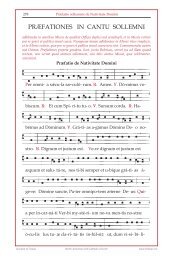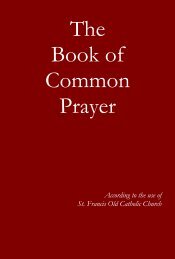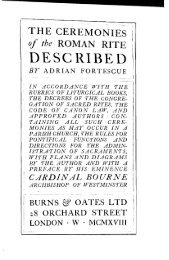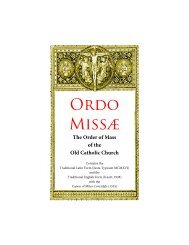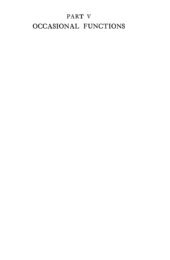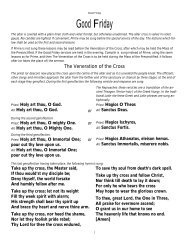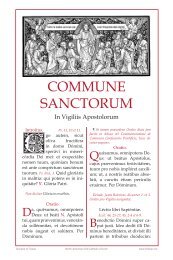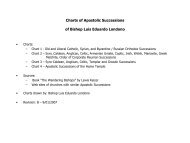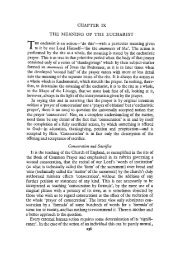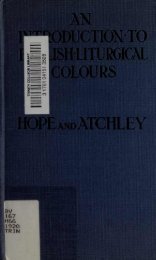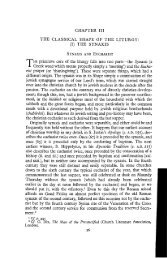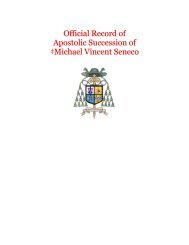Eucharist and Lord's Supper
Eucharist and Lord's Supper
Eucharist and Lord's Supper
Create successful ePaper yourself
Turn your PDF publications into a flip-book with our unique Google optimized e-Paper software.
54 THE SHAPE 01' THE LITURGY<br />
Palestine in our <strong>Lord's</strong> time. The short bread- <strong>and</strong> wine-blessings given<br />
before, which are still in use, are found verbally in Berakoth. 1 All three<br />
forms-the bread <strong>and</strong> wine blessings <strong>and</strong> the first two paragraphs of the<br />
Thanksgiving-can be taken as those which our Lord Himself habitually<br />
used as a pious jew. 2<br />
This, then, is the general jewish background of the last supper, which<br />
the New Testament accounts presuppose almost at every word (especially<br />
is this true of that in I Cor. xi.). It is a chabilrah supper, such as our Lord<br />
<strong>and</strong> His disciples were accustomed to hold regularly, held on this occasion<br />
twenty-four hours before the passover of that year. It is a meal held with<br />
some little formality <strong>and</strong> ceremony because it has a religious significance of<br />
its own.<br />
First come the 'relishes',3 with a cup of wine, in which our Lord does<br />
not join them-'Take this <strong>and</strong> divide it among yourselves, for I say unto<br />
you, I will not drink of the fruit of the vine until the Kingdom of God shall<br />
come' (Luke xxii. 17). It is a sideways allusion to the wine-blessing which<br />
each of them is at that moment saying for himself-'Blessed be Thou, 0<br />
Lord our God, eternal King, Who createst the fruit of the vine'.<br />
Then supper begins in the usual way, with the invariable grace before<br />
meals. Our Lord takes bread <strong>and</strong> breaks it, just as He had always done<br />
before, just as every jewish householder <strong>and</strong> every president of any chabilrah<br />
took it <strong>and</strong> broke it at every supper table in Israel throughout the<br />
year. He 'gives thanks' over it, but the words of His thanksgiving are not<br />
recorded. Of course not! Why should they be? Every jewish child knew<br />
them by heart: 'Blessed be Thou, 0 Lord our God, eternal King, Who<br />
1 M., vi. 1 (p. 43).<br />
• This is the most convenient point to mention the 'Kiddiish-cup', another common<br />
cup additional to the 'cup of blessing', which has a place in the supper ritual<br />
on sabbaths <strong>and</strong> holy days. Cf. Oesterley, op. cit. pp. 167 sq. <strong>and</strong> 184 sq. He would<br />
find a place for it at the last supper, chiefly on the ground that reminiscences of the<br />
prayer with which it would be blessed ('passover-Kiddush') have affected christian<br />
eucharistic prayers. This is possible, but if true would not necessarily prove that<br />
'passover-Kiddiish' was used at the last supper itself. In faet, unless the last supper<br />
was the actual passover supper of that year (<strong>and</strong> Oesterley himself has come<br />
near demonstrating that it was not) there is no reason to suppose that any Kiddiish<br />
prayer or cup found a place in it, since it was not a sabbath or holy day, to which<br />
Kiddiish was restricted. Jewish practice has varied a good deal at different periods<br />
as to where this prayer <strong>and</strong> the accompanying cup should come in the course of the<br />
meal on days when it was used, from before the breaking of bread at the beginning<br />
to before or after the 'cup of blessing' at the end. Ifit was used at the last supper, it<br />
might account for the cup of Luke xxii. 17; but it seems so unlikely that the last<br />
supper fell on a holy day, that this is more likely to be an ordinary cup of wine<br />
served with the 'relishes' before supper began. In any case, the 'Kiddush-cup' was<br />
not confused in jewish practice with the 'cup of blessing', though both were common<br />
cups blessed by the host. They received different blessings, were associated<br />
with different ideas <strong>and</strong> came at different points in the meal.<br />
• It seems to be some traditional recollection of this preliminary course which<br />
makes all three synoptists place the 'breaking of bread' after the beginning of the<br />
supper. In jewish practice this ceremony of breaking bread was always reckoned<br />
the start of the meal itself.



